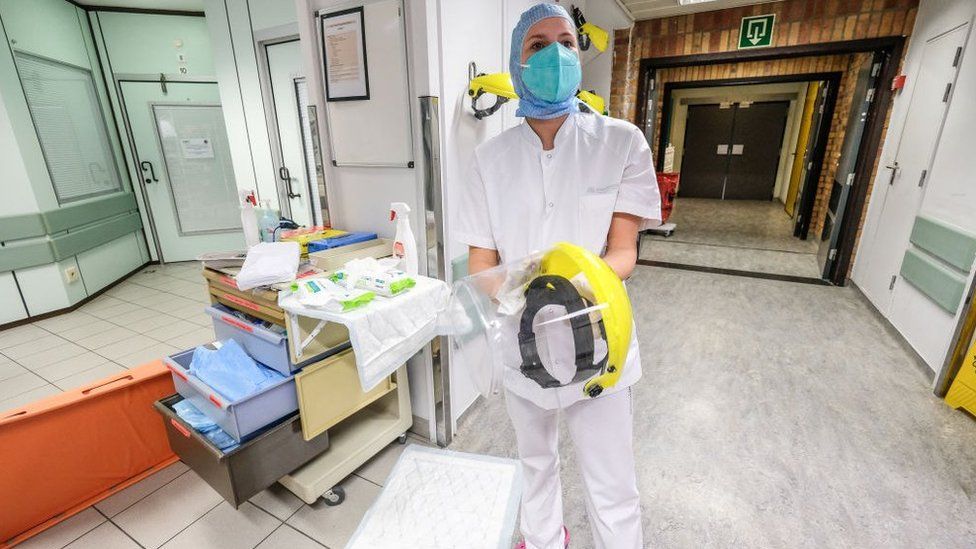Covid: Belgian doctors with coronavirus asked to keep working
- Published

Doctors in the Belgian city of Liège have been asked to keep working even if they have coronavirus amid a surge in cases and hospital admissions.
About a quarter of medical staff there are reportedly off sick with Covid-19.
Now 10 hospitals have requested that staff who have tested positive but do not have symptoms keep working.
The head of the Belgian Association of Medical Unions told the BBC they had no choice if they were to prevent the hospital system collapsing within days.
Dr Philippe Devos acknowledged that there was an obvious risk of transferring the virus to patients.
One in three people tested are coming back positive with the virus in the eastern Belgian city. Hospitals are transferring patients elsewhere and cancelling non-urgent surgeries, days after Health Minister Frank Vandenbroucke warned the country was close to a "tsunami" of infections where authorities "no longer control what is happening".
The decision comes as governments across Europe try to tackle fresh waves of coronavirus infections.
At a news conference on Monday, World Health Organization (WHO) officials suggested travel restrictions, stay at home orders or even national lockdowns may be needed across the continent to tackle the fresh outbreaks.
"Right now we are well behind this virus in Europe, so getting ahead of it is going to take some serious acceleration in what we do," warned WHO emergencies head Dr Mike Ryan.
Italy - hit hard by the virus in March - has closed gyms, theatres and swimming pools in a bid to bring down case numbers. The country reported more than 21,200 new infections on Sunday.
The Italian government has warned that the rise in cases was putting a huge strain on health services, but Prime Minister Giuseppe Conte said that a full lockdown would be catastrophic for the economy.
What measures has Italy introduced?
Restaurants, bars and cafes must stop table service at 18:00 and offer only take-away until midnight. Contact sports are prohibited but shops and most businesses will remain open.
The new restrictions, which are in force until 24 November, will also see 75% of classes at Italy's high schools and universities conducted online instead of in a classroom.
Regional governments had asked for all classes to be conducted via distance learning, Italian media reported, but the move was opposed by Education Minister Lucia Azzolina.
The government is also urging people not to travel outside their home towns or cities unless absolutely necessary and to avoid using public transport if possible.
"We think that we will suffer a bit this month but by gritting our teeth with these restrictions, we'll be able to breathe again in December," Mr Conte told a news conference on Sunday.
The latest restrictions have triggered demonstrations in cities including Naples, Turin and Rome.
What's happening elsewhere in Europe?
Gyms and pools have also closed in the Belgian capital Brussels, and shops must shut at 20:00. Masks are now compulsory in public spaces. These rules will remain in force until 19 November.
In the UK, people aged 16 to 25 are more than twice as likely as older workers to have lost their job during the pandemic, BBC Panorama has found. Research seen by the programme also suggests the education gap between privileged and disadvantaged young people has widened further.
In France, health experts have warned that the number of new Covid-19 cases per day could be about 100,000 - twice the official figure.
Europe's streets empty
Prof Jean-Francois Delfraissy, the head of France's scientific council which advises the government on the pandemic, said the estimated figure included undiagnosed and asymptomatic cases.
He told RTL radio he was surprised by the "brutality" of the second wave which he expected to be much worse than the first, adding: "Many of our fellow citizens have not yet realised what awaits us."
France has already imposed night-time curfews on major cities, including Paris. The country has recorded more than 1.1 million cases in total and 34,780 deaths.
The Czech Republic has also introduced a night-time curfew, which came into effect on Tuesday at midnight for a week. Nobody will be allowed to leave the house between 21:00 and 04:59 each night except to travel to and from work, for medical reasons or a few other exceptions. All shops will be shut on Sundays and will close at 20:00 on other days.
And Spain has declared a national state of emergency and imposed a night-time curfew amid a new spike in Covid-19 infections.
Prime Minister Pedro Sánchez said the curfew, which came into force on Sunday night, would be in place between the hours of 23:00 and 06:00.
Under the measures, local authorities can also ban travel between regions. Spain has seen more than one million cases and 34,750 deaths.
Russia has registered a record 17,347 new daily coronavirus cases, officials said on Monday. Total reported cases have surpassed 1.5 million - but the mayor of the worst-hit city, Moscow, said that while "there is still growth... it is slower".
Gavin Lee reports from the epicentre of Europe's second wave, which is in Belgium
- Published26 October 2020